A second home: Homeschool moms find flexibility, fun at library
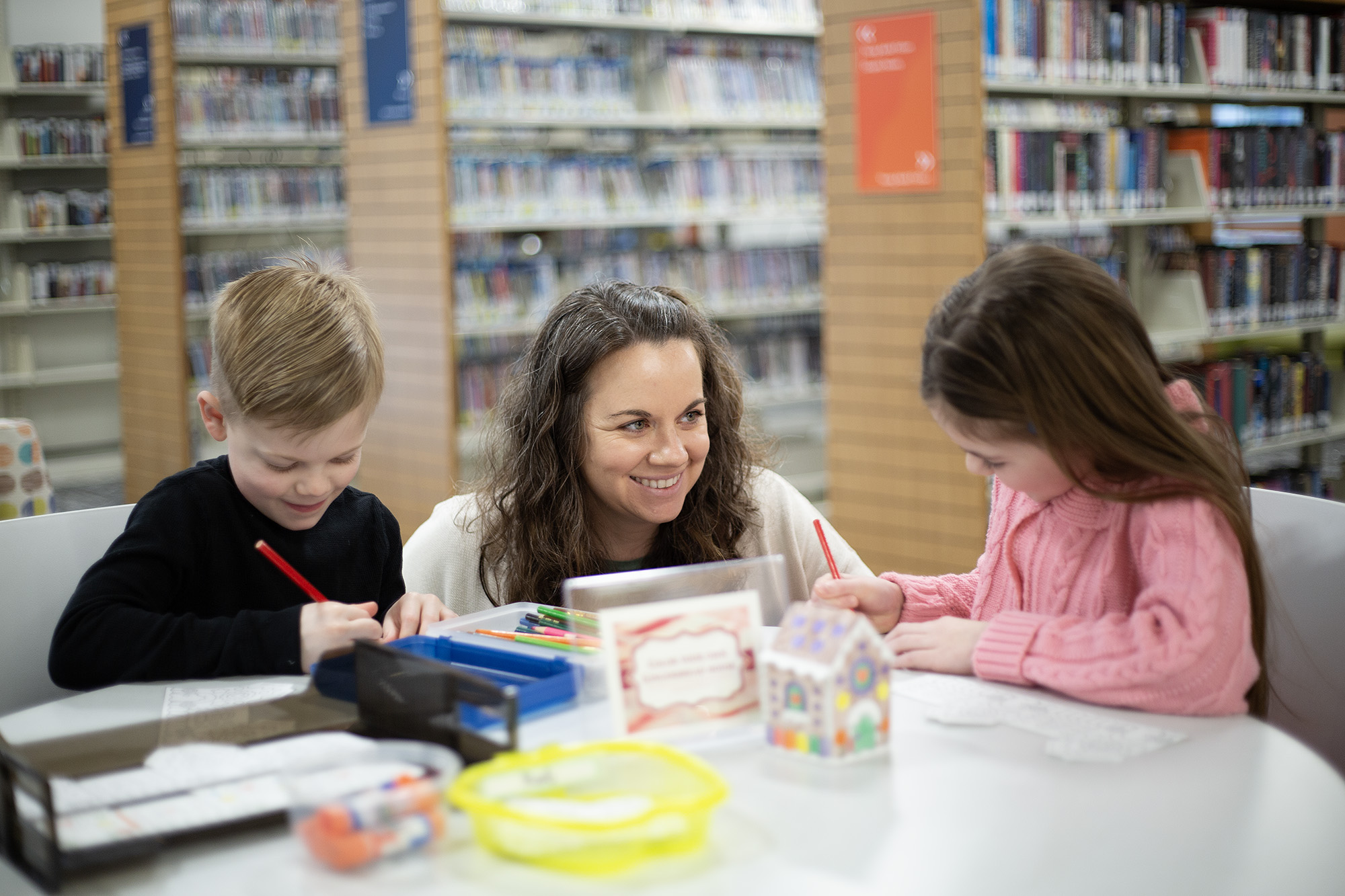
Kim Shearer says her library branch is as familiar as an old sitcom.
“It feels like ‘Cheers’ when we walk in here. Everyone knows our name here,” she says. “We’ve been coming to programs since (my kids) were in diapers, (and staff) remember them.”
In addition to friendly service at the Cleveland Branch of Elkhart Public Library, she makes new and welcome discoveries.
Kim is a homeschooling mom. Like scores of homeschool families in Elkhart, she says EPL provides the freedom and independence parents are looking for to support the education of their children.
Hard-to-find items. Reading for fun. Trusted programs and activities to let kids broaden their skills and interests. Parents around the community say Elkhart Public Library makes homeschooling better.
“We’re made to feel welcome, and that this is a place that we can use, in the way that we need to use it,” Kim says.
The homeschool journey
Kim homeschools her three children: Hailey, 13; Leah, 10; and Ryan, 8. She’s now in her seventh year doing it.
Hailey has mosaic Down syndrome. After kindergarten was a struggle, the family made the choice to switch to homeschooling. They never looked back.
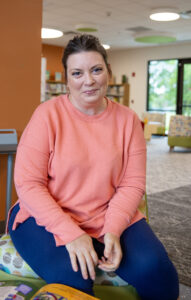
“We decided to try it and it went so well that the other two (kids) have never been to school,” Kim says. “It’s been great. It’s brought our family closer together.”
The decision to homeschool is varied and always personal. But families often say it’s a decision they would make again and again.
“All homeschoolers do things differently. It’s part of the joy and the pain of homeschooling,” says Jenni Hays, who currently homeschools her two youngest kids, 12-year-old Josiah and 14-year-old Toby. Two older children, also homeschooled, are now in college.
For Jamie Holdeman, she started homeschooling teenagers Madison and Landon following the pandemic.
“E-learning didn’t work for my kids,” Jamie says. “There are some children that just don’t absorb learning from a screen. It was so successful that we just kept doing it.”
The curriculums used by homeschoolers vary as much as the reasons for homeschooling. Whatever the specific choices, parents say Elkhart Public Library plays a significant role in the family education.
“I am a fan of physical books. The more that I can put a physical book in their hands is so important. It helps not to have so many things distracting them,” says Jill Leiter. “I think it would be a huge deficit to us to have (the library) taken away.”
Jill currently homeschools 12-year-old Onna and 15-year-old Illaina. She started with her two older daughters a decade ago.
“(EPL) helps homeschooling have a broader horizon than what we can provide in our home,” she says.
A ‘home away from home’
Jill says the library is where her kids first learned to use scissors. Long before any formal schooling, foundational skills are built at the library’s many Storytimes.
“When they’re little – toddlers – it aids in that pre-learning stuff that we might not have known about,” she says. “It’s building a love of learning with your kids.”
Melinda Hull says Storytimes provide an important building block parents should know about for their kids.
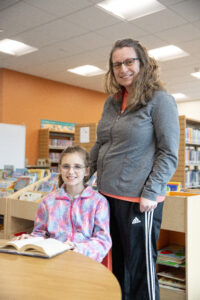
“When they were young, it was about the foundational type of stuff – the reading and listening to other adults,” she says.
Melinda homeschools her daughter, Miriam, 9. Her older sons now attend Clinton Christian School after homeschooling through seventh grade.
But even now, the library provides opportunities for homeschool kids to socialize and interact with other adults outside of the family, she says.
“Kids need to learn to do those ‘grown up’ things,” she says. “They need to check out their own book. They need to get that autonomy that isn’t always there for homeschoolers. I love that they have the independence of having their own library cards. They can learn to search for books.”
As the kids get older, the needs shift. Families say the library’s other programs offer fun boosts to home activities.
“We’ve also done additional things like the art classes, the coding classes, some of those supplemental things that we might have been missing,” says Jill.
Jamie adds, “Whenever people have asked about something to do, I always tell them about the library and the activities.”
The library provides another benefit to parents, too. After all, Messy Play Day and STEM programs can require a clean-up crew.
“The things that are hands on, stuff that I don’t like to do at home, this is where they can come to do the messy things,” Melinda says. Making slime was just one of the memorable programs that didn’t involve carpet cleaning at her home.
Sometimes, it isn’t about programs or activities … just a different learning environment outside the home. Recent library renovations at the four neighborhood branches resulted in meeting rooms and well-lit spaces for parents to use as a change of pace.
“We used one of the meeting rooms and schooled (there) for the afternoon. It’s nice to have a space to do that, it’s something different,” Jenni says. “The library is just a comforting place, it’s kind of a home away from home. My kids love to ride their bikes down here and look around.”
What families need
Kim continues to be surprised by the books she finds at the library, even after years of visiting.
“I was shocked to check out a book in full Russian. It’s things like that that I’m constantly surprised by,” she says. “Most people probably aren’t asking for these books. If it looks like it hasn’t been read in a while, those are probably the ones I want to check out.”
She says she relies on biographies and books written during historic times for her curriculum, which is heavy on first-person accounts.
“I use an approach that uses books for everything. We don’t do anything in textbooks or online,” Kim says. “I don’t think you can beat a book. Our technology does so much, but a book – reading their words, reading their accounts – getting their hands on those words is so much more important.”
When she wanted a book about British history, she found a first edition of Winston Churchill’s “A History of the English-Speaking Peoples.”
“I was shocked that I could get a copy of it here,” she says.
Jill uses the library collection for extra copies of a particular book not available from other sources.
“It’s resources we need to supplement our curriculum,” she says. “If something from our co-op has gotten lost or damaged, or we might have two students using the same book at the same time.”
Kim says she has found many specialty books for her kids’ lessons.
“This semester, we’re studying trees. So I went online and checked out every book I could that made sense. Then, I go through them to see which ones work best,” she says. “For Shakespeare, I check out multiple copies of the books so both kids can have a copy.”
And when they aren’t using books for studies, they can get what they want for leisure reading. Plus, it keeps costs under control.
“It saves me so much money and space in that way,” says Kim.
“There’s no way I could afford to fill up my daughter’s reading appetite,” Jamie says.
“On average, we’re reading three or four books a week,” says Jill.
Parents enjoy the friendly and helpful library staff, who always take the time to help guide the kids to books that are age-appropriate and fit their interests.
“The (staff) here at Osolo are always very good at directing her towards age-appropriate reading,” says Jamie. “They respect my personal preferences.”
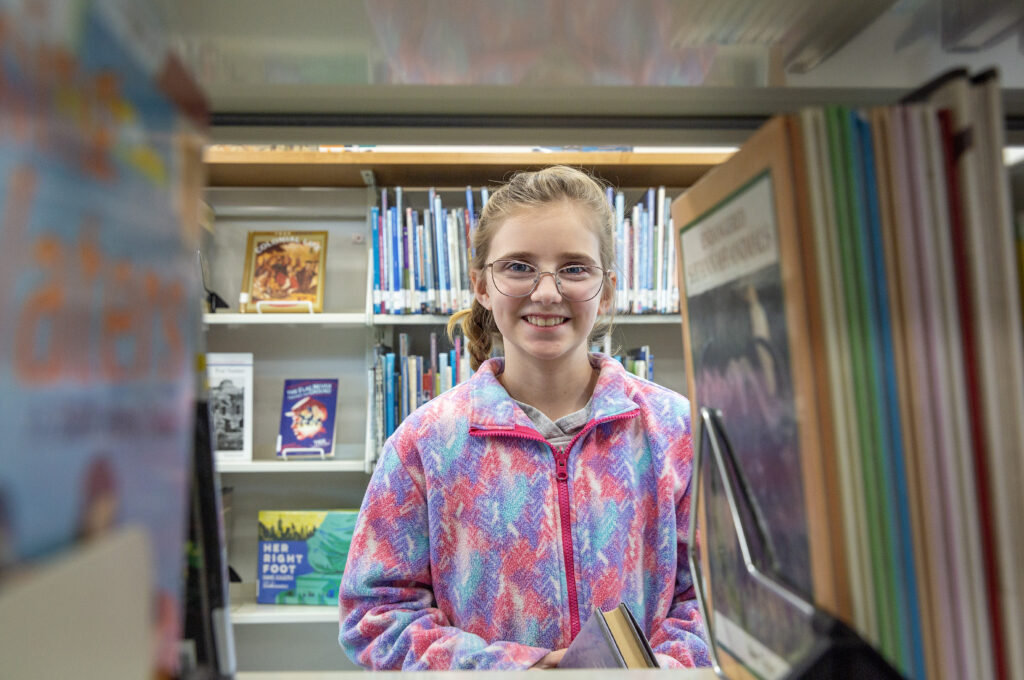
Adds Melinda, “They’re always willing to help, if a kid is interested in a thing, they will help you find them something.”
Outside of regular library hours, parents log onto EPL’s Digital Library. Kim and Melinda both say they’ve checked out audiobooks to listen to in the car. They say the Digital Library helps them discover new book series, as well.
And kids aren’t the only ones learning in home environments. Melinda says she uses library resources to study, too.
“When you homeschool, you plan a lot of things yourself. How do I get my kid to college? How do I get financial aid?” she says. “For me, personally, (I use) the parenting resources and … to research (homeschool) curriculums.”
Melinda adds the library’s adult programs give her a chance to reset: “Homeschool moms are rarely away from their kids, so it’s nice to come and have time to yourself.”
‘Last true free community space’
The freedom and independence with homeschooling is reflected in how the library can be used, parents say.
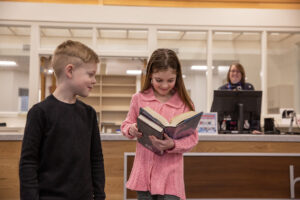
“It’s nice to have a place to go to where everyone can check out what they need,” says Kim. “No one has an agenda here. I can come in here and get what I need. No one is telling me what I need to check out. I can come in and be me and get what I want.”
Jenni says the library plays such an important part of her family’s life that her oldest son, Seth, is now applying to get his master’s degree in library science.
“No one is pushing something one way or the other. It’s here and, one way or another, it’s here if you want,” says Jenni. “It’s the last true free community space. It can meet the needs of anybody.”
Families say the library community is what makes it feel like going to a familiar place.
“The library is always welcoming and patient,” Melinda says. “They are welcoming of everyone that comes, they make everyone comfortable.”